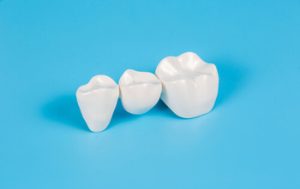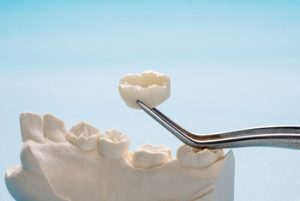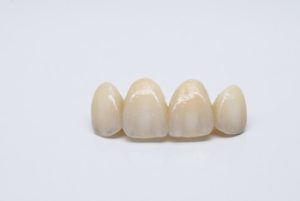Choosing a dental crown can feel like a big step, especially when it involves both your appearance and your comfort. With so many types of crowns available, each offering different levels of durability and cost, it helps to know what sets them apart. Some are known for their long-lasting strength, while others focus more on matching your natural smile. Understanding these differences makes it easier to choose a crown that suits your needs and budget. Whether you’re replacing a damaged tooth or finishing a dental treatment, knowing your options is the first step toward a confident decision. The journey to a comfortable and lasting solution begins with learning about the types of dental crowns and cost.
What Is a Dental Crown?
A dental crown is a customised restoration that covers a damaged or decayed tooth to support its function and shape. It’s crafted to resemble natural teeth, helping maintain a consistent appearance, especially in visible areas like the front teeth. Crowns are crafted to fit over the existing natural tooth structure, offering protection without removing the entire tooth. They are often used when a decayed tooth cannot be restored with a simple filling.
Which Types of Dental Crowns Are Available, and What Do They Cost in Australia?
Knowing which crown option suits your needs can make a big difference when planning a dental treatment. Different materials offer varying levels of strength, look, and cost, which makes knowing your choices essential.
 Porcelain Crowns for a Natural Look
Porcelain Crowns for a Natural Look
Porcelain crowns are often selected for their realistic appearance and ability to match surrounding teeth. They are especially popular for front teeth, where appearance matters most. These crowns offer good durability but may be more prone to chipping under strong pressure. They tend to fall in the mid to high range of pricing, with costs in Australia typically starting from $1,300 per tooth. Their popularity lies in balancing cosmetic value and functional strength.
Fused to Metal Crowns for Extra Support
Fused to metal crowns combine a metal core with a porcelain outer layer. This blend allows for increased strength while maintaining a tooth-like look. However, over time, a dark line might appear near the gum if gums recede. The cost of these crowns generally start at around $1,400. They are often recommended for back teeth, where durability takes priority over aesthetics.
Gold Crowns for Long-Term Durability
Gold crowns are valued for their strength and longevity, especially for molars that undergo significant pressure during chewing. Though less common now due to their colour, they are still chosen for their excellent wear resistance. The cost of gold crowns in Australia can start from $1,200 per tooth, depending on the amount of gold used. They are a reliable option when function outweighs appearance.
Ceramic Crowns for Metal-Free Restoration
Ceramic crowns offer a metal-free solution and are often used when patients have metal sensitivities. These crowns provide a smooth finish and natural colour, ideal for visible teeth. Although slightly less strong than zirconia, they still provide dependable support. In terms of pricing, ceramic crowns typically can start from $1,300 per tooth. They offer a blend of comfort and aesthetic appeal.
Zirconia Crowns for Maximum Strength
Zirconia crowns are known for their exceptional toughness and are often used when additional durability is needed. They are less likely to crack or chip compared to other options. These crowns are often used for both front and back teeth due to their versatile look and function. The cost of zirconia crowns in Australia can start from $1,500 per tooth. Their longevity and strength make them an ideal choice for those wanting fewer replacements.
Stainless Steel Crowns for Temporary Use
Stainless steel crowns are usually used as a temporary solution or for children’s teeth. They are cost-effective and quick to place, often used when a long-term restoration is not yet needed. These crowns are not typically used for adult permanent teeth due to their metallic appearance. Their cost is lower, usually starting from $500. They offer a practical short-term option before a more permanent material is selected.
Each crown type meets different goals depending on budget, aesthetic needs, and function.
What Determines the Cost of Dental Crowns?
While the cost may vary between clinics, several important factors contribute to what you ultimately pay for your treatment.
Material Used in the Crown
One of the main factors affecting dental crown cost is the material chosen for the restoration. Options like ceramic, zirconia, or porcelain fused to metal each come with different price points. The material not only influences cost but also affects how the crown blends with your surrounding teeth. Your dentist will usually recommend a material based on the tooth’s location, function, and your aesthetic preferences.
Tooth Location and Complexity
The position of the tooth requiring the crown also plays a role in pricing. Crowns placed on molars may cost more due to their size and the greater amount of pressure they endure during chewing. Teeth that are harder to access might take more time to treat, increasing the cost of the procedure. Additionally, crowns on front teeth often require extra attention to match the shade and shape of adjacent teeth. This level of customisation may result in a slightly higher fee.
Additional Treatments Required
Some patients may need preparatory procedures before the crown can be placed. These can include root canal therapy, removal of decay, or placement of a foundation build-up if much of the original tooth is missing. Each of these steps adds to the overall cost of treatment. The presence of gum issues or the need for additional imaging may also influence your final bill. By addressing all underlying conditions first, the outcome is more stable and long-lasting.
Laboratory and Customisation Costs
Dental crowns are often made in laboratories, and the complexity of the design impacts the pricing. More detailed or artistic work needed to match your natural teeth results in higher fabrication costs. Some clinics work with advanced dental labs that offer superior aesthetics and durability, which may be reflected in the total fee. The quality of the technician’s work ensures that the crown fits precisely and looks natural in your smile. These customised elements contribute to both appearance and comfort.
Dentist’s Expertise and Technology
The skill and experience of the dental team, along with the technology used during your visit, can affect the tooth crown cost. Clinics that use digital scanning, 3D imaging, and high-grade equipment may offer more efficient and accurate results. While this might slightly raise the cost, it often improves the quality of the outcome. Choosing a practice that uses modern techniques, like ours, can also mean fewer follow-ups and better long-term success. The combination of expertise and technology supports both comfort and reliability.
Location and Clinic Type
The clinic’s location can also influence the price. Urban areas with higher overheads may have slightly increased rates compared to regional settings. The type of clinic, whether boutique, family-focused, or part of a larger network, may affect pricing structures. It is common for prices to vary depending on how services are packaged and what is included. Transparency about what is covered in the quote helps avoid unexpected costs. By comparing options, you can make a decision that fits your budget without compromising on quality.
What Are the Steps Taken During a Dental Crown Procedure?
When a tooth is damaged, weakened, or cosmetically affected, restoring its function and appearance becomes a priority. Understanding the stages involved in the crown placement process can help reduce uncertainty and guide expectations before your dental appointment.
Assessment and Treatment Planning
The process for getting a dental crown starts with an assessment by your dentist to evaluate the tooth and nearby areas, deciding if a crown is necessary. X-rays may be taken to check the roots and ensure no underlying issues are present. If any decay or damage is found that needs addressing before crown placement, this will be discussed during the consultation. Once it is clear that a crown is the right choice, your dentist will move forward with preparation.
 Preparing the Tooth for the Crown
Preparing the Tooth for the Crown
To make room for the crown, the tooth must be reshaped. This involves removing a portion of the outer structure so the crown can fit properly and comfortably. The amount of reshaping depends on the type of crown and the extent of existing damage. If a large area of the tooth is missing, the dentist may build it up using filling material. This helps support the crown and ensures it remains stable once placed.
Taking Impressions for a Custom Fit
After shaping the tooth, the next step is capturing an impression. This ensures the crown will match the natural contours and bite of your other teeth. Your dentist may use a putty-like material or digital scanning tools to create an accurate mould. These impressions are then sent to a dental laboratory where the permanent crown is crafted. This step is essential for both comfort and function, as the final result needs to fit seamlessly into your bite.
Placing a Temporary Crown for Protection
To safeguard the prepared tooth before the permanent crown arrives, a temporary crown will be placed. Typically constructed from acrylic or resin, it helps maintain the tooth’s appearance and chewing function until the final crown is ready. While wearing this interim solution, it’s important to be gentle when eating and avoid sticky or hard foods. You’ll also be advised to contact your dentist if the temporary crown becomes loose or uncomfortable.
Fitting the Permanent Crown
Upon the completion of your permanent crown, you’ll return for a fitting. The dentist will remove the temporary crown, test the new crown for proper fit, colour, and shape, and make any necessary adjustments. Once the crown fits securely and naturally, it will be cemented in place, finalising the dental crown procedure and bringing back the function and appearance of your tooth.
Ensuring Long-Term Success
After placement, your dentist will provide care instructions to help protect the crown and surrounding teeth. Good hygiene and regular check-ups are key to maintaining the results. Permanent crowns are designed to last, but keeping them clean and avoiding excessive pressure extends their lifespan. Following these steps ensures your restored tooth continues to perform well for years to come.
How Can a Dental Crown Benefit Your Smile and Oral Health?
 A dental crown can play a valuable role in restoring both the strength and natural appearance of a tooth that has been weakened or damaged. It acts like a cap, covering the entire visible part of the tooth and protecting it from further wear or fracture. This added support can improve your ability to bite and chew comfortably while also helping to maintain the alignment of surrounding teeth. For teeth that have been discoloured or worn down, a crown offers a cosmetic improvement that blends with your natural teeth. By preserving the structure of the tooth and reducing strain on adjacent ones, it supports long-term oral health. Crowns are often used after procedures like root canals or large fillings to reinforce the treated area. With proper care, a dental crown can help you smile more confidently while keeping your mouth functioning well for years to come.
A dental crown can play a valuable role in restoring both the strength and natural appearance of a tooth that has been weakened or damaged. It acts like a cap, covering the entire visible part of the tooth and protecting it from further wear or fracture. This added support can improve your ability to bite and chew comfortably while also helping to maintain the alignment of surrounding teeth. For teeth that have been discoloured or worn down, a crown offers a cosmetic improvement that blends with your natural teeth. By preserving the structure of the tooth and reducing strain on adjacent ones, it supports long-term oral health. Crowns are often used after procedures like root canals or large fillings to reinforce the treated area. With proper care, a dental crown can help you smile more confidently while keeping your mouth functioning well for years to come.
Ready to Explore Your Options?
Making a choice about dental crowns comes down to more than just appearance. It involves understanding how different materials work with your teeth and your lifestyle. Whether you are weighing up porcelain or ceramic crowns for their natural look or comparing cost with durability, the right solution should balance function, aesthetics, and value.
Talking to a dentist who understands your goals makes the decision smoother and more reassuring. The type of crown you choose today can influence your oral comfort and dental strength for years ahead. At our clinic, we take the time to walk you through your options, helping you feel confident in your next steps. If you’re ready to learn more or want to find out which type of crown suits your situation, please call us on (02) 8806 3799. We’re here to support you with tailored care that fits your needs and preferences.
References
https://www.healthdirect.gov.au/dental-crown-procedure
https://www.colgate.com/en-us/oral-health/bridges-and-crowns/what-are-dental-crowns-and-tooth-bridges









